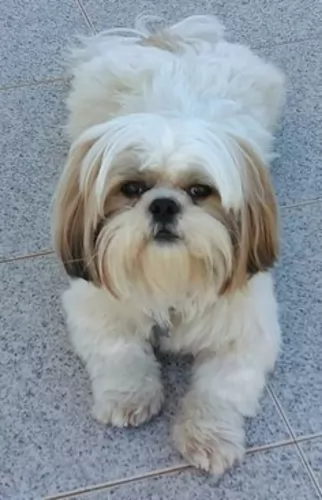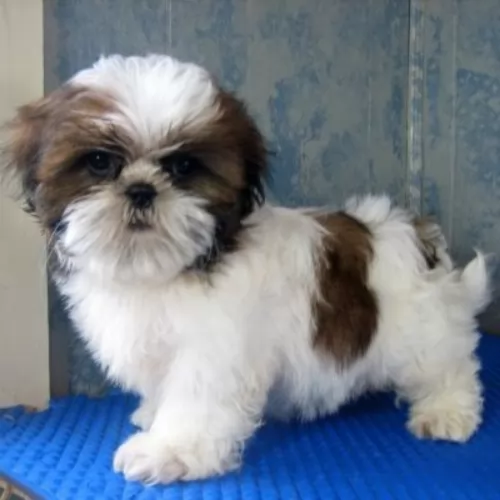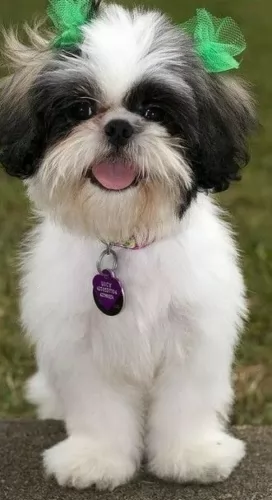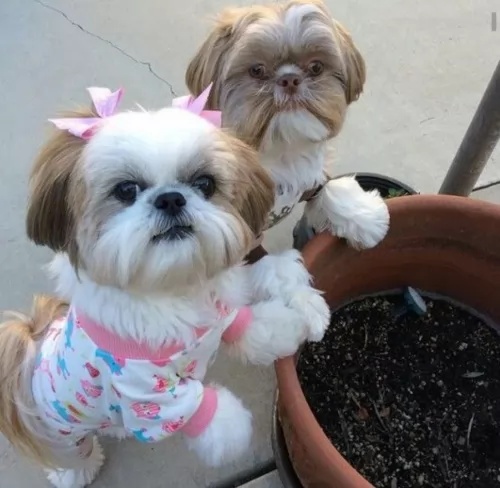 Petzlover
PetzloverHawaiian Poi Dog is originated from Indonesia but Shih Tzu is originated from China. Hawaiian Poi Dog may grow 10 cm / 4 inches higher than Shih Tzu. Hawaiian Poi Dog may weigh 8 kg / 18 pounds more than Shih Tzu. Hawaiian Poi Dog may live 10 years less than Shih Tzu. Hawaiian Poi Dog may have less litter size than Shih Tzu. Hawaiian Poi Dog requires Low Maintenance. But Shih Tzu requires High Maintenance
The Hawaiian Poi Dog was a descendent of the dogs brought to the Islands by the Polynesian. These Polynesian dogs were themselves descendants of the kuri dog of New Zealand. These kuri dogs were originally from Indonesia. The Hawaiian Poi dog is now extinct but at one time was considered the spiritual protector of Hawaiian children and also used as food by hungry Native Hawaiians.
The dog was called poi which was the word for a food staple mad from the root of Taro and used to put weight on the dogs before they were eaten. Meat was not fed to the dogs because it was too scarce. There was no large mammals to hunt and so the breed was never given a standard. The Poi dog seen by European explorers were short legged, pot bellied canines that lived with the hogs in the towns. Because of what they ate, the dogs were not highly intelligent but were stubborn and hard to train. Because the dogs were not suited for much beyond food and a spiritual charm, they became extinct when the traditional religion was no longer practiced and eating dogs was no longer acceptable. The breed pretty much disappeared by the early 20th century. Very few images of the dogs remain except for ancient petroglyphs.
There was an attempt by the Honolulu Zoo in the late 1960’s to redevelop the breed using local dogs to determine a standard. Then the local dogs were bred as close to the standard as possible. In the third generation one dog was born with the traits of a Poi dog. There was not much more success with this and then the Polynesian ship travel between Tahiti and Hawaii was recreated and a dog taken along.
Today’s mixed breed dogs in Hawaii are called Poi dogs but also have the stubbornness, unique appearance and ability to eat anything it is given like the original Poi. The dogs are small, and should not be confused with the original Poi dogs.
 The Shih Tzu is an Imperial Chinese breed developed by palace breeders hundreds of years ago with breed stock from the Tibetan lines. It is quite probable that the Shih Tzu was originally a cross between two Sino-Tibetan ancient dogs – the Pekingese and the Lhasa Apso. Based on their looks, the Shih Tzu means the lion dog, but they were really very pampered palace dogs living with the Chinese emperors and families. The emperors were always gifting the breeders who developed the most affectionate, gentle and beautiful Shih Tzus.
The Shih Tzu is an Imperial Chinese breed developed by palace breeders hundreds of years ago with breed stock from the Tibetan lines. It is quite probable that the Shih Tzu was originally a cross between two Sino-Tibetan ancient dogs – the Pekingese and the Lhasa Apso. Based on their looks, the Shih Tzu means the lion dog, but they were really very pampered palace dogs living with the Chinese emperors and families. The emperors were always gifting the breeders who developed the most affectionate, gentle and beautiful Shih Tzus.
Until the 1930’s the Shih Tzu was not known to the world outside the emperor’s palace. Once the breed did come out from behind the palace walls, they were immediately popular. Much debate went on about how to refine the breed as clubs began to spring up in Peking and then in England. It was not until 1969 the Shih Tzu was recognized and entered in the AKC Stud Book.
While the original Shih Tzu might have been a mix between the Pekingese and the Lhasa Apso, today’s breed spread around the world after the second world war. In Europe in the 1930’s the breed was classified as Apsos. In 1935 the first Shih Tzu Club of Europe was formed, and the first standard was written, and the breed was categorized as the Shih Tzu.
Following World War II, soldiers brought the dogs to the States from Europe. By the 1950’s the breed was growing in popularity and the AKC recognized the breed in 1969 as members of the Toy Group. They are now recognized by all major kennel clubs throughout the western world. They are recognized by the Federation Cynoloqique Internationale in the Companion and Toy Group, among Tibetan breeds.
The Shih Tzu is a good watchdog, but it was bred to be a companion animal. It is a friendly, open breed that welcomes strangers. They are great with other animals and children as well as adults.
As previously mentioned the Poi dog is somewhat unusual in size and shape due to what they ate. They looked somewhat like the native dogs of Polynesia and New Zealand. They have short legs, long bodies, somewhat obese and a very flat head. He had a short smooth coat, in any color or any pattern. They were however mostly brown and they might or might not have white markings.
 This is a breed of lively, sturdy and alert little dogs with a beautiful double coat that is flowing and long. In its full glory the Shih Tzu coat is touching the floor all the way around the dog. The dog’s bearing is as royal as its history, arrogantly carrying his head high and his tail curving over his back.
This is a breed of lively, sturdy and alert little dogs with a beautiful double coat that is flowing and long. In its full glory the Shih Tzu coat is touching the floor all the way around the dog. The dog’s bearing is as royal as its history, arrogantly carrying his head high and his tail curving over his back.
The Shih Tzu is a solid, compact breed with weight and substance. They may be a small dog, but they are a strong one. They have large dark eyes with a short muzzle and fur covered drop ears. They are just a little longer than they are tall with a distinct underbite.
There are a few differences between the European or UK Kennel Club standard and the American Kennel Club AKC standard. As opposed to the UK standard the AKC standard states that:
• The hindquarters are muscular while the front are straight. They are balanced in that they are not too long or too short.
The Hawaiian Poi dog was very friendly and good with children
The Poi was considered a good luck charm and a spiritual protector of children
Given what they faced in life, the Poi dog was very adaptable, living anywhere on the islands and eating anything it could find.
Due to their poor diet, the Hawaiian Poi dog was seriously lacking in intelligence and learning ability.
 2.Special talents – they were bred to be companion animals. They are friendly and loyal.
2.Special talents – they were bred to be companion animals. They are friendly and loyal.
3.Adaptability Yes very much so. They can live in an apartment or on a farm. It doesn’t matter and they don’t need a yard.
Probably due to its diet, the Poi dog had several problems to their health. Their poor diet led to a sluggishness both in movement and intelligence. Its development was hampered by a lack of protein. Malnutrition and serious over inbreeding caused a weakness and poor oral hygiene. Due to this lack of teeth and chewing the bones in the dogs heads became flat. The Poi had breathing issues and overall lethargy.
 For many breeds that have the advantage of isolation like the Shih Tzu did with the emperors of China usually have very little genetic health issues. Most of the breed is indeed healthy but there are some issues.
For many breeds that have the advantage of isolation like the Shih Tzu did with the emperors of China usually have very little genetic health issues. Most of the breed is indeed healthy but there are some issues.
• Brachycephalic airway obstructive syndrome due to the shape of their face and head causes them to have breathing issues. They cannot handle heat and they cannot swim. They can have an upper airway obstruction that makes it hard for them to breath. If this is bad enough, surgery may be required.
• Hypothyroidism – thyroid does not produce the hormones necessary for metabolism to work effectively. This can lead to weight gain, hair loss, lethargy and muscle loss. It can be treated effectively.
• Issues of the eyes include – cataracts, corneal dryness and inflammation, progressive retinal atrophy, improperly closing eyelids and retinal detachment.
With meat being rare in Hawaii, none was available for the dogs. They were fed Poi – from the Taro plant roots. Puppies were fed 2-3 times a day.
The adult dog was fed once or twice a day the same as Poi puppies were fed.
The Hawaiian Poi dog basically has not good health points.
The Poi dog did not need and did not get much exercise, leading to its demise.
 1.Feeding the puppy – this is a toy dog so don’t overfeed. They have a tendency to become obese. Calorie and weight level need to be calculated with any diet you feed. The diet should be high quality with plenty of protein made for toy dogs. Feed the puppy at least 3 times a day, maybe four in very small amounts, never more than ½ cup per day.
1.Feeding the puppy – this is a toy dog so don’t overfeed. They have a tendency to become obese. Calorie and weight level need to be calculated with any diet you feed. The diet should be high quality with plenty of protein made for toy dogs. Feed the puppy at least 3 times a day, maybe four in very small amounts, never more than ½ cup per day.
2.Feeding the adult - this is a toy dog so don’t overfeed. They have a tendency to become obese. Calorie and weight level need to be calculated with any diet you feed. The diet should be high quality with plenty of protein made for toy dogs. Feed the adult once or twice a day in larger amounts than the puppy but never more than ¾ of a cup per day.
3.Points for Good Health - most Shih Tzu’s are hardy with exceptionally good health.
This is a pampered, not high energy dog. However, she still needs playtime, which can be indoors and short walks outdoors every day.